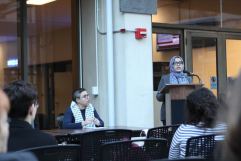Students for Justice in Palestine (SJP) presented “Boycott, Divestment and Sanctions Movement (BDS) at Universities” on March 22 at the Lincoln Center campus. The event hosted student activists involved in SJP at other institutions and proceeded regardless of the club’s unofficial status at Fordham University.
Sapphira Lurie, FCLC ’17, and fellow SJP members organized the Lincoln Center event with aid from various university departments.
As an unofficial Fordham sponsored club, SJP is not allowed to host or book events through Student Life Council. However, Lurie said“the administration allowed the event because it was sponsored academically.”
SJP was able to occupy the atrium by the request of Fordham’s Comparative Literature program, English, modern languages, African and African American studies, women, gender, and sexuality studies, Latin American and Latino studies institute and anthropology departments, according to Lurie.
Christopher Rodgers, dean of students, said that it was not unusual for academic departments to sponsor such events. “This seems like a fairly common and unremarkable practice in higher education,” said Rodgers. “It assures that a wide variety of viewpoints are present and explored on our campuses- a tremendous positive.”
The event hosted students and alumni who were involved in SJP clubs at their respective schools. Katherine Azcona, a John Jay alumnus, Sarah Aly, a Brooklyn College alumnus and Aya Slimani, a Columbia University student, all served as event panelists.
The event requested the panelists speak out for “SJPs around the country [that] are subject to censorship and administrative repression,” according to the event’s Facebook page.
The panelists gave advice regarding SJP’s future endeavors. Aly recommended that SJP’s protests advertise a broader argument that concerns freedom of speech and to later narrow their argument to discuss the core issues SJP stands for.
“People may not necessarily be left wing or otherwise, but many will still vogue for your right to say what you have to say,” said Aly. “You can appeal to people through freedom of speech. Make sure the wording of your petitions and your rallies is focused on your right to be a club and to be able to share your ideas at club events.”
Aly said the club should continue to seek help from within the university. “I also think a huge resource to use is the faculty on campus,” said Aly. “Especially with the narrative of free speech.”
The academic sponsorship of “BDS at Universities” is the most recent instance in which Fordham faculty came to Lurie’s aid.
Lurie recently underwent a disciplinary hearing with Fordham administration and was charged with holding a protest without proper authorization. She said that thus far faculty support has been instrumental in SJP’s ongoing fight for free speech.
“When I had my hearing, there were 120 faculty [petition] signers and supporters asking for the administrations to drop the charges against me,” said Lurie
Lurie said that she and other SJP members would be taking the event of the hearing into consideration as they go about future club business in an attempt to prevent further conflict with Fordham administration. However, SJP will continue to organize on campus until its demands are reached, according to Lurie.“The events of the hearing is a consideration going forward,” said Lurie. “But all I can really say is that we are going to continue to organize on campus and make our voices heard.”
SJP demands to be granted full club status, an apology from the administration addressed to students involved in SJP, a written statement guaranteeing free speech on campus and that the University ensure equal treatment for all students regardless of their national origins, according to its Facebook page.





